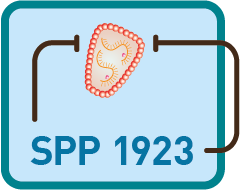Role of IFI16 in retroviral restriction and immune sensing

Project Member

Prof. Dr. Frank Kirchhoff
Project Leader
Prof. Dr. Frank Kirchhoff
Phone: +49 731 50065 – 150
Fax: +49 731 50065 – 153
Frank.Kirchhoff@uni-ulm.de
Institute of Molecular Virology
Ulm University Medical Center
Meyerhofstrasse 1
89081 Ulm
Germany

Matteo Bosso, M.Sc. in
Molecular Biotechnology
Project Summary
Using evolutionary genomics, transcriptomics, and protein interaction data, we identified gamma-interferon-inducible protein 16 (IFI16) as potential antiretroviral restriction factor. In the first funding period of this SPP, we performed thorough functional and mutational analyses of IFI16. We found that IFI16 restricts HIV‑1 independently of immune sensing by sequestering the transcription factor Sp1 and inhibiting viral gene expression. Antiretroviral activity and Sp1 interaction require the N‑terminal pyrin domain and nuclear localization of IFI16, but not the HIN domains involved in DNA binding. Interestingly, we found that highly prevalent subtype C strains that are responsible for about half of all HIV‑1 infections worldwide are less dependent on Sp1 and capable of evading IFI16-mediated restriction. In addition, our results suggest that IFI16 plays a role in the maintenance of HIV‑1 latency and the control of the LINE 1 retrotransposon. IFI16 is only one of five human PYHIN proteins and our data suggest that two other members of this family (MNDA and IFIX) share the antiviral activity of IFI16. Finally, experiments in knockout mice indicate that PYHIN proteins restrict retroviral spread in vivo, independently of effects on interferon production. Altogether, our results support an important role of PYHIN proteins in the innate immune defense against retroviral pathogens. However, many questions regarding the underlying mechanisms and the relevance of PYHIN proteins for virus restriction remain to be addressed. In the 2nd funding period, we will determine the exact mechanism of IFI16-mediated inhibition of Sp1 and analyze the consequences for Sp1-driven cellular gene expression. Another goal will be to clarify, how subtype C HIV‑1 strains evade IFI16 inhibition and to elucidate the role of IFI16 and Sp1 inhibition in HIV latency. In addition, we will examine the effects of human PYHIN proteins on endogenous retroelements. Finally, we will perform collaborative studies to determine the relevance of PYHIN proteins for retroviral restriction in vivo. Our results will clarify whether PYHIN proteins play key roles in transcriptional silencing of exogenous retroviruses and endogenous retroelements.


